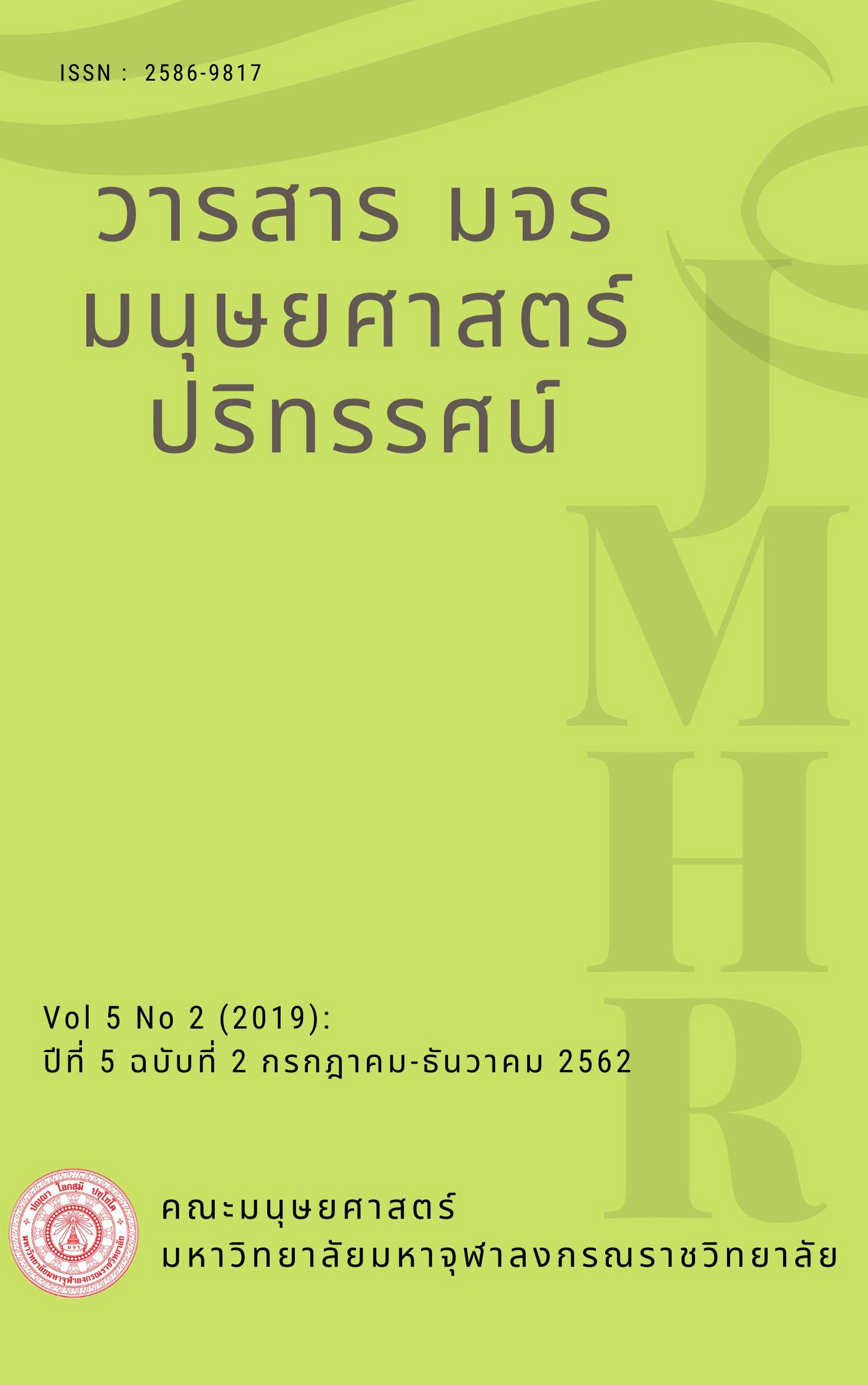การเจริญสติในวิถีพุทธจิตวิทยา
คำสำคัญ:
สติ, สมาธิ, พุทธจิตวิทยาบทคัดย่อ
บทความนี้มีจุดมุ่งหมายให้เห็นถึงความหมาย มุมมอง ขอบเขต ความสำคัญของการเจริญสติ ในมุมมองของนักจิตวิทยาตะวันตก เช่น Jon Kabat-Zinn, BrownและRyan, Rick Hason เป็นต้น และมุมมองทางพุทธศาสนาโดยพระพุทธโฆษาจารย์ (ป.อ.ปยุตฺโต) และหลวงพ่อเทียน จิตฺตสุโภ นอกจากนี้ยังได้นำเสนอการเจริญสติอย่างไรให้ได้ผล จนเกิดทักษะในการเจริญสติโดยใช้หลักการทางสมอง คือ ทฤษฎีกระบวนการทางสมองในการประมวลผลข้อมูล (Information processing Theory) ของ Atkinson และ Shiffrin ในการอธิบายเพื่อทำให้เกิดการจำสภาวะของการมีสติได้ บทความนี้จึงเป็นการนำหลักการทางสมองทางจิตวิทยา และหลักธรรมทางพุทธศาสนา มาบูรณาการในการอธิบายการเจริญสติตามวิถีพุทธจิตวิทยา เพื่อแก้ปัญหาต่างๆ ที่เกิดขึ้นในชีวิตที่เกิดจากการขาดสติ อาทิเช่น การคิดลบ ความสัมพันธ์ที่ไม่ดี ปัญหาการเรียน ปัญหาการงาน ปัญหาการเงิน รวมไปถึงปัญหาสุขภาพ ซึ่งถ้ามีการเจริญสติอย่างต่อเนื่อง ก็จะส่งผลต่อชีวิตที่ดีขึ้น สุขภาพดีขึ้น และมีความสุขมากขึ้น
เอกสารอ้างอิง
เทียน จิตฺตสุโภ. (2531). แด่เธอผู้รู้สึกตัว. (พิมพ์ครั้งที่ 6). กรุงเทพมหานคร: กลุ่มเทียนสว่างธรรม.
พระพรหมคุณาภรณ์ (ป.อ. ปยุตโต). (2553). พจนานุกรมพุทธศาสตร์ ฉบับประมวลศัพท์. (พิมพ์ครั้งที่ 14). กรุงเทพมหานคร: มูลนิธิการศึกษาเพื่อสันติภาพ.
“_________”. (2552). พุทธธรรมฉบับปรับปรุงและขยายความ. พิมพ์ครั้งที่ 15. กรุงเทพมหานคร: สหธรรมิก.
Atkinson, R. C., & Shiffrin, R. M. (1968). Human memory: A proposed system and its control processes. In K. W. Spence and J. T. Spence (eds.), The psychology of learning and motivation: Advances in research and theory.
Brown, K. W., Ryan, R. M., & Creswell, J. D.. (2007). Mindfulness: Theoretical Foundations and Evidence for its Salutary Effects. Psychological Inquiry. 18(4), 211-237.
Carmody, J., & Baer, R. (2008). Relationships between mindfulness practice and levels of mindfulness, medical and psychological symptoms and well-being in a mindfulness-based stress reduction program. Journal of Behavioral Medicine. 31(1), 23-33.
Davidson. R. (2013). The Emotional Life of your Brain. Retrieved June 13, 2019, from https://mgronline.com/dhamma/detail/9560000079672.
Hanson. R. (2009), Buddha’s Brain, Oakland. New Harbinger Publications.
Kabat-Zinn, J. (1994). Wherever you go, there you are : mindfulness meditation in everyday life. New York: Hyperion.
Lee, W. K., & Bang, H. J. (2010). The effects of mindfulness‐based group intervention on the mental health of middle‐aged Korean women in community. Stress and Health. 26(4), 341-348.
Meng Tan. C. (2012). Search Inside yourself. Retrieved June 10,2019, from http://www.winnews.tv/news/22680.
Shapiro, S. L., Oman, D., Thoresen, C. E., Plante, T. G., & Flinders, T. (2008). Cultivating mindfulness: effects on well‐being. Journal of Clinical Psychology. 64(7), 840-862.






